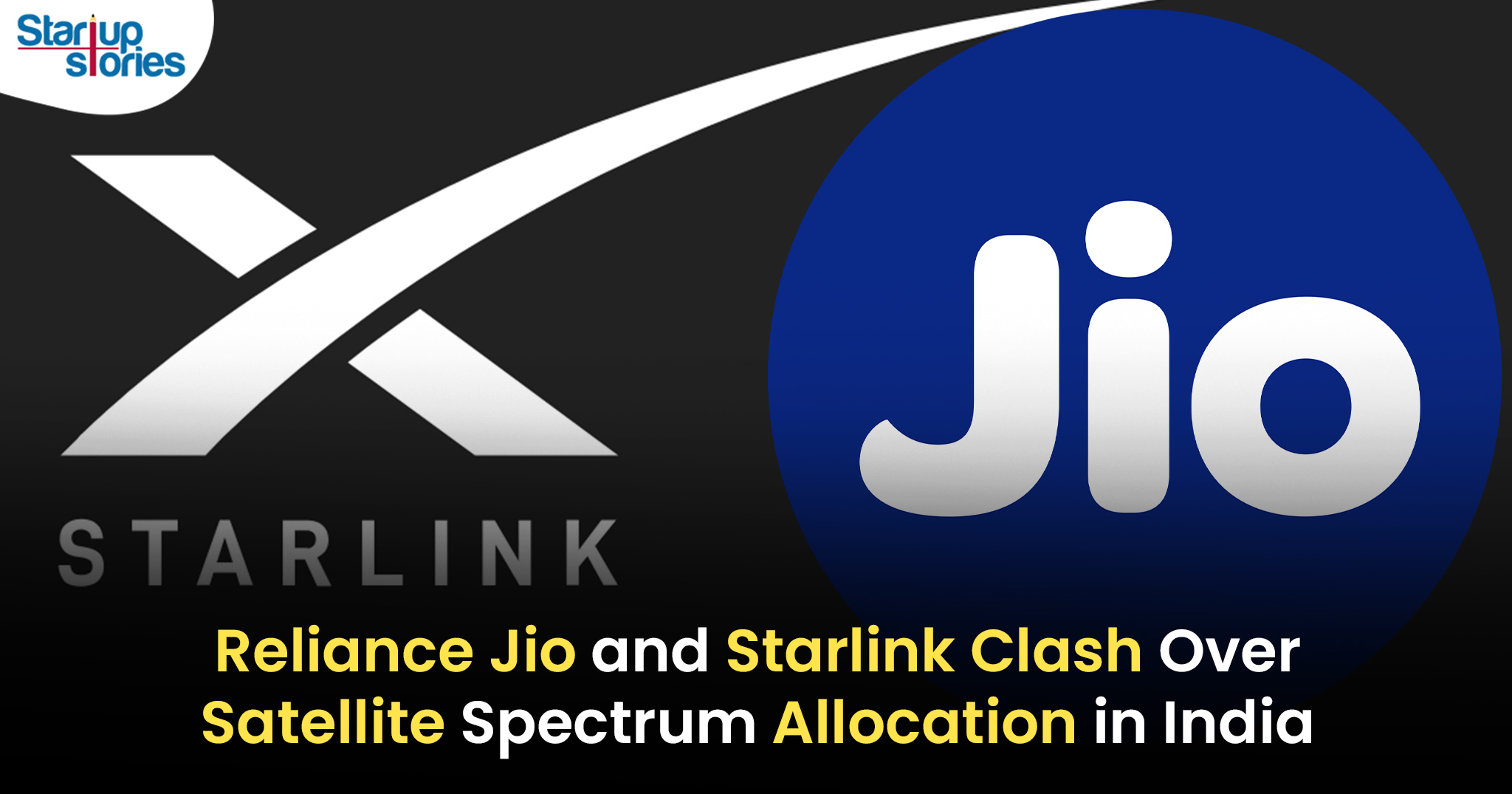Latest News
Ambani’s Reliance Engages in Regulatory Battle Over Satellite Spectrum with Musk’s Starlink!

In a significant regulatory showdown, Indian telecom giant Reliance Jio is vying with Elon Musk’s Starlink over the allocation of satellite broadband spectrum in India. Reliance is urging the Telecom Regulatory Authority of India (TRAI) to auction the spectrum rather than allocate it administratively, arguing that this approach would promote fair competition in the burgeoning satellite broadband market.
Background of the Dispute
According to a letter obtained by Reuters, Reliance Jio contends that the telecom regulator has wrongly concluded that home satellite broadband spectrum should be allocated instead of auctioned. This dispute arises as the Indian satellite broadband market is projected to grow at an annual rate of 36%, reaching $1.9 billion by 2030, according to Deloitte.
While Musk’s Starlink and other global players like Amazon’s Project Kuiper advocate for administrative allocation, Ambani—Asia’s wealthiest individual and head of Reliance Jio—maintains that an auction process is essential for equitable competition. The crux of the disagreement revolves around the interpretation of Indian law, which some industry insiders believe allowed for the spectrum allocation last year as per Musk’s preferences.
TRAI’s Consultation Process
TRAI is currently conducting a public consultation on this matter. However, in a private letter dated October 10, Reliance requested a reevaluation of the process, arguing that the regulator has “pre-emptively interpreted” that allocation is the appropriate course of action. “TRAI seems to have concluded, without any basis, that spectrum assignment should be administrative,” wrote Kapoor Singh Guliani, Reliance’s senior regulatory affairs official, in his correspondence with India’s Telecom Minister Jyotiraditya Scindia.
Level Playing Field Advocacy
Reliance’s letter also highlighted that TRAI’s consultation paper suggests Indian laws require the allocation of spectrum for such services without comprehensive studies. “We have requested TRAI to amend the consultation paper to ensure a level playing field,” Reliance Jio stated, emphasizing the need for consultation regarding the methodology of spectrum assignment.
A senior TRAI official responded, affirming that due process is being followed and inviting Reliance to provide feedback during the consultation period. The recommendations from TRAI will ultimately influence the government’s decision on the spectrum allocation process.
Market Dynamics and Future Implications
Musk is eager to launch Starlink services in India, but unresolved issues regarding spectrum allocation remain a significant hurdle. Starlink argues that administrative allotment of licenses aligns with global practices, while Reliance insists that an auction is vital for creating a fair competitive environment. This contention is particularly relevant as foreign entities may offer voice and data services that could challenge traditional telecom players.
Implications for Consumers
The outcome of this regulatory battle will have profound implications for Indian consumers:
- Service Quality: Starlink’s advanced technology promises high-speed internet with lower latency, improving user experience, particularly in underserved regions.
- Pricing Pressure: Increased competition between Reliance and Starlink could drive down prices, making satellite internet services more affordable for a broader segment of the population.
- Innovation and Growth: Access to cutting-edge satellite technology could spur innovation across multiple sectors, from education to healthcare, potentially transforming India’s digital landscape.
Conclusion
The battle for control over satellite spectrum in India highlights the delicate balance between encouraging domestic business interests and embracing global technological advancements. Reliance’s call for auctions aligns with protecting local telecom players but denying or delaying the entry of advanced satellite services like Starlink could slow down India’s digital revolution.
Ultimately, the Indian government will need to carefully weigh the potential benefits of Starlink’s satellite technology against the need to protect domestic businesses. The decision on how to allocate satellite spectrum will not only shape the competitive landscape of the telecommunications sector but also determine the pace at which India’s digital future unfolds.
As this regulatory battle unfolds, it represents more than just corporate rivalry; it is a critical moment for India as it navigates its path toward becoming a global digital powerhouse. How this issue is resolved will reverberate far beyond boardrooms, affecting millions of consumers and shaping India’s telecommunications infrastructure for years to come.
Latest News
Peak XV New Funds: $1.3B Commitment for India Startup Surge 2026

Peak XV Partners has launched three new funds totaling $1.3 billion, targeting India’s booming startup ecosystem. The lineup features the $600M Surge fund (8th edition) for early-stage ventures, a $300M Growth Fund for Series B+ scaling, and a $400M Acceleration Fund for rapid portfolio expansion. This commitment arrives as India’s VC inflows rebound, with AI and fintech leading 2026 trends.
These funds build on Peak XV’s legacy of backing unicorns like Zomato and Pine Labs, offering founders capital plus strategic guidance amid post-winter recovery. Early-stage deals surged 20% last year per Tracxn, positioning Peak XV to fuel the next wave of innovation in SaaS, climate tech, and consumer plays.
For startups eyeing Peak XV new funds or Surge fund 2026 applications, this signals prime opportunities. Investors and marketers should watch for deployment updates India remains a global VC hotspot.
Latest News
D2C Brand Neeman’s Raises $4 Million for Tier 2/3 Store Expansion & Eco-Friendly Shoes

Hyderabad, January 13, 2026 Neeman’s, India’s leading D2C footwear brand famed for sustainable shoes and patented PIXLL® technology, has raised $4 million from existing investors. This funding boosts its cumulative capital past $10 million since 2015, with a post-money valuation nearing $50 million. CEO Vijay Chahoria emphasized offline retail as the “next frontier,” planning 50+ new stores in Tier 2/3 cities like Jaipur and Lucknow to blend eco-friendly innovation with hands-on customer experiences.
In India’s booming D2C ecosystem where footwear sales hit ₹1.2 lakh crore in 2025 Neeman’s targets hybrid retail amid high online CAC and 25-30% returns. Backed by vegan, machine-washable shoes priced ₹2,000-4,000, the brand leverages PIXLL® (5x more breathable than leather) for carbon-neutral comfort. Recent 5x revenue growth to ₹100 crore ARR, 1M+ pairs sold via Myntra and stores, and awards at India D2C Summit 2025 position it ahead of rivals like Paaduks.
Neeman’s offline expansion India eyes the $15B sustainable footwear market by 2028, fueled by PLI schemes, Gen Z’s 70% eco-preference (Nielsen), and Southeast Asia exports. Challenges like real estate costs are offset by data-driven inventory and omnichannel QR tech. Watch for Q1 2026 launches in Hyderabad and Bengaluru redefining D2C success through authentic, “Wear the Change” branding.
Latest News
Centre Mulls Revoking X’s Safe Harbour Over Grok Misuse

The Centre is weighing the option of revoking X’s safe harbour status in India after its AI chatbot Grok was allegedly misused to generate and circulate obscene and sexually explicit content, including material seemingly involving minors. The IT Ministry has already issued a notice to X, directing the platform to remove unlawful content, fix Grok’s safeguards, act against violators, and submit a detailed compliance report within a tight deadline. If the government finds X’s response inadequate, it could argue that the platform has failed to meet due‑diligence standards under Indian law, opening the door to harsher action.
Under Section 79 of the IT Act, safe harbour protects intermediaries like X from being held directly liable for user‑generated content, provided they follow due‑diligence rules and promptly act on legal takedown orders. Revoking this protection would mean X and its officers could be exposed to criminal and civil liability for obscene, unlawful, or harmful content that remains on the platform, including AI‑generated images from Grok. This prospect significantly raises X’s compliance risk in India and could force tighter moderation, stricter AI controls, and more aggressive removal of flagged posts.
The Grok episode also spotlights the regulatory grey zone around generative AI, where tools can create harmful content at scale even without traditional user uploads. Policymakers are increasingly questioning whether AI outputs should still enjoy the same intermediary protections as conventional user posts, especially when they involve women and children. How the government ultimately proceeds against X over Grok misuse could set a precedent for AI accountability, platform responsibility, and safe harbour interpretation in India’s fast‑evolving digital ecosystem.












Madonna Burbach
April 14, 2025 at 3:50 pm
Thanks for another informative website. Where else may just I am getting that kind of info written in such a perfect way? I’ve a challenge that I am just now operating on, and I have been at the look out for such information.
alquilar una dirección en Suiza
April 17, 2025 at 5:06 am
I’ll immediately grab your rss as I can not to find your e-mail subscription hyperlink or e-newsletter service. Do you’ve any? Kindly permit me know so that I could subscribe. Thanks.
Ernest Hendrics
May 3, 2025 at 12:03 am
Some truly nice and utilitarian info on this website, also I conceive the layout contains great features.
MLB Live Streams Free
May 9, 2025 at 4:10 pm
Este site é realmente demais. Sempre que acesso eu encontro coisas incríveis Você também pode acessar o nosso site e descobrir mais detalhes! informaçõesexclusivas. Venha descobrir mais agora! 🙂
Бонус за регистрацию в binance
May 19, 2025 at 5:34 am
Your article helped me a lot, is there any more related content? Thanks!
Lovetta Esmon
June 1, 2025 at 8:27 pm
You are a very clever individual!
transfert aéroport
June 6, 2025 at 6:35 am
Hey There. I found your blog using msn. This is a really well written article. I’ll be sure to bookmark it and come back to read more of your useful info. Thanks for the post. I’ll certainly return.
3gbfx
June 7, 2025 at 9:54 pm
clomiphene without insurance cost of generic clomid for sale clomiphene medication effects can you buy clomid prices cost generic clomiphene without a prescription where to get generic clomiphene tablets can i purchase clomid without insurance
Binance Pag-sign Up
June 19, 2025 at 3:04 am
Can you be more specific about the content of your article? After reading it, I still have some doubts. Hope you can help me.
Alta Spataro
June 29, 2025 at 8:13 pm
It’s the best time to make a few plans for the longer term and it’s time to be happy. I’ve learn this post and if I may I want to counsel you few fascinating things or suggestions. Perhaps you can write next articles referring to this article. I desire to read more issues approximately it!
Hawaii medical malpractice lawyer
July 24, 2025 at 7:07 am
I have been surfing online more than 3 hours these days, yet I never found any attention-grabbing article like yours. It’s beautiful worth enough for me. In my opinion, if all web owners and bloggers made excellent content material as you probably did, the net will be a lot more useful than ever before. “When you are content to be simply yourself and don’t compare or compete, everybody will respect you.” by Lao Tzu.
Grand Prairie ac repair
August 6, 2025 at 3:47 pm
I am not really great with English but I get hold this really leisurely to read .
web design
August 7, 2025 at 8:58 am
Nice weblog here! Also your site quite a bit up very fast! What host are you using? Can I am getting your associate link on your host? I wish my site loaded up as quickly as yours lol
olxtoto
August 15, 2025 at 6:57 am
After study a few of the blog posts on your website now, and I truly like your way of blogging. I bookmarked it to my bookmark website list and will be checking back soon. Pls check out my web site as well and let me know what you think.
hptoto
August 16, 2025 at 1:33 am
But wanna input that you have a very nice internet site, I love the style it really stands out.
situs slot gacor
August 18, 2025 at 2:58 pm
After research a number of of the blog posts in your web site now, and I really like your means of blogging. I bookmarked it to my bookmark web site checklist and can be checking again soon. Pls check out my website as well and let me know what you think.
situs toto 176
August 18, 2025 at 8:12 pm
Just a smiling visitant here to share the love (:, btw outstanding pattern. “Make the most of your regrets… . To regret deeply is to live afresh.” by Henry David Thoreau.
ayuda PFG arquitectura
August 24, 2025 at 8:50 pm
I’m curious to find out what blog system you’re using? I’m having some small security problems with my latest site and I would like to find something more secure. Do you have any recommendations?
ayuda PFC arquitectura
August 25, 2025 at 12:22 am
I gotta favorite this web site it seems very useful very helpful
Jeremy Cucuta
November 2, 2025 at 11:43 pm
There is obviously a lot to realize about this. I assume you made various nice points in features also.
MM88
November 5, 2025 at 10:59 am
Với giao diện mượt mà và ưu đãi hấp dẫn, MM88 là lựa chọn lý tưởng cho các tín đồ giải trí trực tuyến.
iwin
November 6, 2025 at 2:15 am
iwin – nền tảng game bài đổi thưởng uy tín, nơi bạn có thể thử vận may và tận hưởng nhiều tựa game hấp
FemiPro
November 10, 2025 at 2:04 am
I am not real superb with English but I come up this really easygoing to translate.
J88
November 10, 2025 at 4:10 pm
Đến với J88, bạn sẽ được trải nghiệm dịch vụ cá cược chuyên nghiệp cùng hàng ngàn sự kiện khuyến mãi độc quyền.
谷歌蜘蛛池
November 10, 2025 at 7:52 pm
利用强大的谷歌蜘蛛池技术,大幅提升网站收录效率与页面抓取频率。谷歌蜘蛛池
GO88
November 14, 2025 at 8:11 am
Tham gia cộng đồng game thủ tại Go88 để trải nghiệm các trò chơi bài, poker phổ biến nhất hiện nay.
Sergio Brogden
November 16, 2025 at 3:25 am
Thanks for another informative website. The place else may I get that kind of information written in such an ideal manner? I’ve a challenge that I am just now operating on, and I have been at the glance out for such info.
Kuwin
November 17, 2025 at 4:24 pm
kuwin sở hữu kho game đa dạng từ slot đến trò chơi bài đổi thưởng, mang đến cho bạn những giây phút giải trí tuyệt vời.
the brain song review
November 21, 2025 at 2:00 am
I¦ve recently started a website, the information you provide on this web site has helped me greatly. Thank you for all of your time & work.
honey trick for memory loss
December 1, 2025 at 11:37 pm
Hello, you used to write fantastic, but the last several posts have been kinda boring… I miss your tremendous writings. Past few posts are just a little out of track! come on!
bandar slot gacor
December 7, 2025 at 5:25 am
I love the efforts you have put in this, regards for all the great articles.
Odkryj jak
December 9, 2025 at 1:02 am
Nicely delivered
Live Boxing Streaming
December 10, 2025 at 2:40 am
Hello! I could have sworn I’ve been to this blog before but after browsing through some of the post I realized it’s new to me. Anyways, I’m definitely happy I found it and I’ll be book-marking and checking back frequently!
Ethical hackers for business
December 12, 2025 at 6:48 am
I think this is among the most significant info for me. And i am glad reading your article. But should remark on some general things, The website style is great, the articles is really nice : D. Good job, cheers
AtomCasino
December 13, 2025 at 3:52 am
https://t.me/s/atom_official_casino
Casino
December 14, 2025 at 5:23 am
https://t.me/s/ezcash_officials
Casino
December 14, 2025 at 2:21 pm
https://t.me/s/Martin_officials
fool GPTZero and Turnitin
December 18, 2025 at 8:38 pm
Glad to be one of many visitors on this amazing website : D.
kazino_s_minimalnym_depozitom
December 19, 2025 at 5:10 am
https://t.me/s/kazino_s_minimalnym_depozitom
fdertol mrtokev
December 20, 2025 at 8:30 am
Oh my goodness! an incredible article dude. Thank you Nevertheless I am experiencing concern with ur rss . Don’t know why Unable to subscribe to it. Is there anybody getting an identical rss downside? Anybody who is aware of kindly respond. Thnkx
Ezcash_Officials
December 20, 2025 at 8:34 pm
https://t.me/s/Ezcash_Officials
dmarket.web.id
December 24, 2025 at 10:14 pm
This web site is really a walk-through for all of the info you wanted about this and didn’t know who to ask. Glimpse here, and you’ll definitely discover it.
starz
December 25, 2025 at 11:48 am
https://t.me/s/Officials_888STARZ
MARTIN
December 25, 2025 at 5:47 pm
https://t.me/s/it_marTin_CASiNo
alquiler camion mudanza sin conductor
December 30, 2025 at 2:38 am
I have been exploring for a little bit for any high-quality articles or blog posts on this sort of house . Exploring in Yahoo I ultimately stumbled upon this website. Reading this info So i?¦m satisfied to show that I have a very excellent uncanny feeling I found out exactly what I needed. I such a lot definitely will make sure to don?¦t fail to remember this web site and provides it a look on a continuing basis.
7kCasino
December 30, 2025 at 3:00 am
https://t.me/s/officials_7k_casino
Javier Jacomet
December 30, 2025 at 1:00 pm
Hello, you used to write wonderful, but the last few posts have been kinda boringK I miss your tremendous writings. Past few posts are just a bit out of track! come on!
7kCasino
December 30, 2025 at 10:48 pm
http://www.google.by/url?q=https://t.me/officials_7k/673
1win
January 2, 2026 at 3:21 pm
https://telegra.ph/1win–vash-provodnik-v-mir-azarta-razvlechenij-i-vygodnyh-predlozhenij-01-02
zaborna torilon
January 21, 2026 at 4:35 pm
I really enjoy looking at on this internet site, it has got superb blog posts. “A short saying oft contains much wisdom.” by Sophocles.
oacmcyjf
February 5, 2026 at 2:39 pm
https://askoff.ru